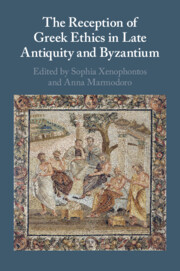Book contents
- The Reception of Greek Ethics in Late Antiquity and Byzantium
- The Reception of Greek Ethics in Late Antiquity and Byzantium
- Copyright page
- Contents
- Tables
- Contributors
- Acknowledgements
- Abbreviations
- Introduction
- Part I Ethics across the Late-antique and Byzantine Period
- Chapter 1 Sexual Difference and the Difference It Makes
- Chapter 2 Ethics and the Hierarchy of Virtues from Plotinus to Iamblichus
- Chapter 3 Neoplatonic Contemplative Ethics
- Chapter 4 Ethics, Virtue and Theurgy
- Chapter 5 Imitation and Self-Examination
- Chapter 6 The Reception of Greek Ethics in Christian Monastic Writings
- Chapter 7 Understanding Self-Determination and Moral Selfhood in the Sources of Late-antique and Byzantine Christian Thought
- Chapter 8 ‘Singing with David and Contemplating Agesilaus’
- Part II Prominent Ethical Views of the Time
- Bibliography
- Index Locorum
- Index of Names and Subjects
Chapter 6 - The Reception of Greek Ethics in Christian Monastic Writings
from Part I - Ethics across the Late-antique and Byzantine Period
Published online by Cambridge University Press: 15 June 2021
- The Reception of Greek Ethics in Late Antiquity and Byzantium
- The Reception of Greek Ethics in Late Antiquity and Byzantium
- Copyright page
- Contents
- Tables
- Contributors
- Acknowledgements
- Abbreviations
- Introduction
- Part I Ethics across the Late-antique and Byzantine Period
- Chapter 1 Sexual Difference and the Difference It Makes
- Chapter 2 Ethics and the Hierarchy of Virtues from Plotinus to Iamblichus
- Chapter 3 Neoplatonic Contemplative Ethics
- Chapter 4 Ethics, Virtue and Theurgy
- Chapter 5 Imitation and Self-Examination
- Chapter 6 The Reception of Greek Ethics in Christian Monastic Writings
- Chapter 7 Understanding Self-Determination and Moral Selfhood in the Sources of Late-antique and Byzantine Christian Thought
- Chapter 8 ‘Singing with David and Contemplating Agesilaus’
- Part II Prominent Ethical Views of the Time
- Bibliography
- Index Locorum
- Index of Names and Subjects
Summary
Christian monastic literature represents a unique genre within Late-antique and Byzantine literature. Scholars have debated for centuries the diverse influences which shaped such texts, but something of a consensus has emerged that, notwithstanding the obvious and predominant influence of the Christian Bible, these texts have also been influenced by the ethical reflections of Greek philosophy.
It is impossible to deny the obvious parallels between the insights of Greek philosophers—in particular the Neoplatonists (soul-body dualism; a transcendent, otherworldly finality of human existence; a well-ordered society which sublimates individual ambition to the common good) and Stoics (to live 'in accordance with reason' or 'self-sufficiently') —and Christian monastic literature.
This chapter will argue that, although Christian monastic writers rarely had direct access to Greek philosophical texts, they nonetheless absorbed the collective wisdom of these texts as filtered through the Hellenistic Christianity of their day, many of whose chief intellectuals—such as Clement and Origen of Alexandria—had already managed a creative fusion of Greek wisdom with the Christian Gospel.
- Type
- Chapter
- Information
- Publisher: Cambridge University PressPrint publication year: 2021

